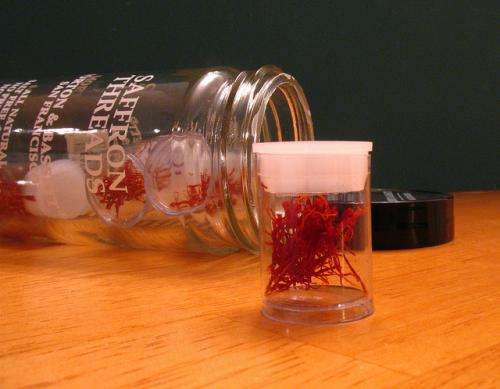Saffron packs a punch for mental illness

The popular spice saffron has shown to be a safer alternative to pharmaceutical antidepressants in some instances by producing less severe side effects than medications, according to Murdoch University scientists.
Clinical psychologist Adrian Lopresti and Professor Peter Drummond reviewed published research on randomised, double-blind clinical trials conducted until April 2014 which investigated saffron as a potential antidepressant.
The review covered six studies involving 230 clinically depressed participants which found saffron was as effective in treating clinically diagnosed major depressive disorder as the commonly prescribed commercial medications fluoxetine (trade name Prozac) and imipramine (trade name Tofranil).
"So far the literatures shows saffron is as effective as pharmaceuticals," Dr Lopresti says.
"Saffron has had a number of really well designed, robust studies investigating its antidepressant properties and pretty much all the studies have been positive," he says.
Less severe side effects than pharmaceuticals
The review also found in many cases saffron had a better safety profile than commercial antidepressants.
In previous trials comparing saffron to pharmaceutical antidepressants, sedation, constipation, sexual dysfunction and tremor were the side effects most associated with pharmaceuticals.
However, in studies which compared saffron to a placebo, side effects commonly experienced were anxiety, increased appetite, nausea and headaches.
"Saffron certainly had less severe side effects than pharmaceutical medication," Dr Lopresti says.
"The most common side effect, which is really only minor, was digestive issues."
However, Dr Lopresti acknowledges that a much larger sample size is needed to verify the side effects of saffron.
"We need thousands of samples to get a good idea of the side effects, but so far it looks like there is a better safety profile for saffron," he says.
The review also identified ideal dosages and the spice's mechanisms of action.
"What's been found in the literature over the last ten years is that people with depression have high levels of inflammation and free radical damage associated with oxidative stress," Dr Lopresti says.
"That led to interesting work looking into antioxidants and anti-inflammatories as antidepressants."
Saffron contains crocin, a potent anti-inflammatory, and crocetin an antioxidant.
The review found 15mg taken twice a day was sufficient and Dr Lopresti says this would cost a patient in Australia $30 a month to take saffron in capsule form.
Dr Lopsresti hopes in the future these types of treatments can be used as aids, either to boost pharmaceutical treatments, or on their own as less severe forms of treatment.
More information: Lopresti A. L., and Drummond P. D. (2014), "Saffron (Crocus sativus) for depression: a systematic review of clinical studies and examination of underlying antidepressant mechanisms of action," Hum. Psychopharmacol Clin Exp, 29, 517–527, DOI: 10.1002/hup.2434













